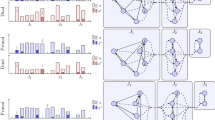Abstract
We show that a 2-variable integer program, defined by m constraints involving coefficients with at most ϕ bits can be solved with O(m + ϕ) arithmetic operations on rational numbers of size O(ϕ).
This result closes the gap between the running time of two-variable integer programming with the sum of the running times of the Euclidean algorithm on ϕ-bit integers and the problem of checking feasibility of an integer point for m constraints.
Access this chapter
Tax calculation will be finalised at checkout
Purchases are for personal use only
Preview
Unable to display preview. Download preview PDF.
Similar content being viewed by others
References
Aho, A.V., Hopcroft, J.E., Ullman, J.D.: The Design and Analysis of Computer Algorithms. Addison-Wesley, Reading (1974)
Clarkson, K.L.: Las vegas algorithms for linear and integer programming when the dimension is small. Journal of the Association for Computing Machinery 42, 488–499 (1995)
Eisenbrand, F.: Short vectors of planar lattices via continued fractions. Information Processing Letters 79(3), 121–126 (2001)
Eisenbrand, F.: Fast integer programming in fixed dimension. Technical Report MPI-I-2003-NWG2-002, Max-Planck-Institut für Informatik, Saarbrücken, Germany (2003) (to appear in the Proceedings of ESA 2003)
Eisenbrand, F., Rote, G.: Fast 2-variable integer programming. In: Aardal, K., Gerards, B. (eds.) IPCO 2001. LNCS, vol. 2081, pp. 78–89. Springer, Heidelberg (2001)
Feit, S.D.: A fast algorithm for the two-variable integer programming problem. Journal of the Association for Computing Machinery 31(1), 99–113 (1984)
Gauß, C.F.: Disquisitiones arithmeticae. Gerh. Fleischer Iun. (1801)
Hirschberg, D.S., Wong, C.K.: A polynomial algorithm for the knapsack problem in two variables. Journal of the Association for Computing Machinery 23(1), 147–154 (1976)
Kanamaru, N., Nishizeki, T., Asano, T.: Efficient enumeration of grid points in a convex polygon and its application to integer programming. International Journal of Computational Geometry & Applications 4(1), 69–85 (1994)
Kannan, R.: A polynomial algorithm for the two-variable integer programming problem. Journal of the Association for Computing Machinery 27(1), 118–122 (1980)
Kannan, R., Lovász, L.: Covering minima and lattice-point-free convex bodies. Annals of Mathematics 128, 577–602 (1988)
Khintchine, A.Y.: Continued Fractions. Noordhoff, Groningen (1963)
Knuth, D.: The art of computer programming, vol. 2. Addison-Wesley, Reading (1969)
Lagarias, J.C.: Worst-case complexity bounds for algorithms in the theory of integral quadratic forms. Journal of Algorithms 1, 142–186 (1980)
Lenstra, H.W.: Integer programming with a fixed number of variables. Mathematics of Operations Research 8(4), 538–548 (1983)
Megiddo, N.: Linear programming in linear time when the dimension is fixed. Journal of the Association for Computing Machinery 31, 114–127 (1984)
Scarf, H.E.: Production sets with indivisibilities. Part I: generalities. Econometrica 49, 1–32 (1981)
Scarf, H.E.: Production sets with indivisibilities. Part II: The case of two activities. Econometrica 49, 395–423 (1981)
Schönhage, A.: Fast reduction and composition of binary quadratic forms. In: International Symposium on Symbolic and Algebraic Computation, ISSAC 1991, pp. 128–133. ACM Press, New York (1991)
Schrijver, A.: Theory of Linear and Integer Programming. John Wiley, Chichester (1986)
Zamanskij, L.Y., Cherkasskij, V.D.: A formula for determining the number of integral points on a straight line and its application. Ehkon. Mat. Metody 20, 1132–1138 (1984)
Author information
Authors and Affiliations
Editor information
Editors and Affiliations
Rights and permissions
Copyright information
© 2003 Springer-Verlag Berlin Heidelberg
About this paper
Cite this paper
Eisenbrand, F., Laue, S. (2003). A Faster Algorithm for Two-Variable Integer Programming. In: Ibaraki, T., Katoh, N., Ono, H. (eds) Algorithms and Computation. ISAAC 2003. Lecture Notes in Computer Science, vol 2906. Springer, Berlin, Heidelberg. https://doi.org/10.1007/978-3-540-24587-2_31
Download citation
DOI: https://doi.org/10.1007/978-3-540-24587-2_31
Publisher Name: Springer, Berlin, Heidelberg
Print ISBN: 978-3-540-20695-8
Online ISBN: 978-3-540-24587-2
eBook Packages: Springer Book Archive




